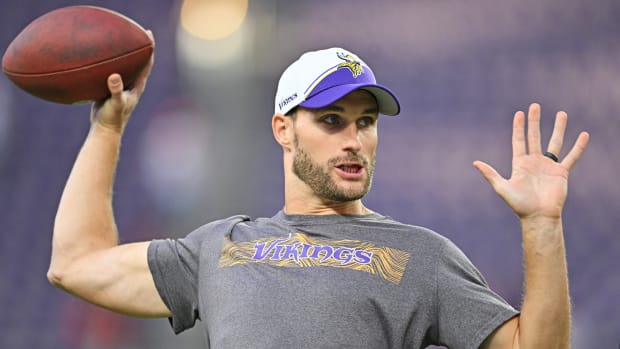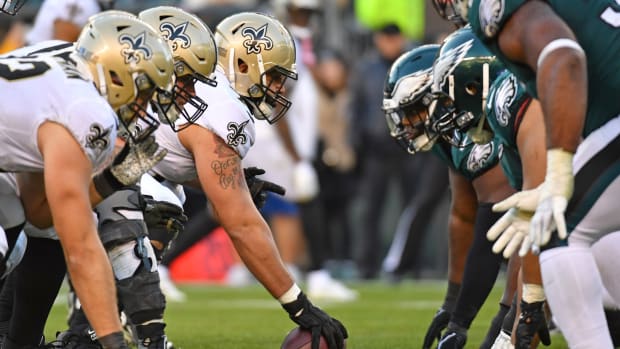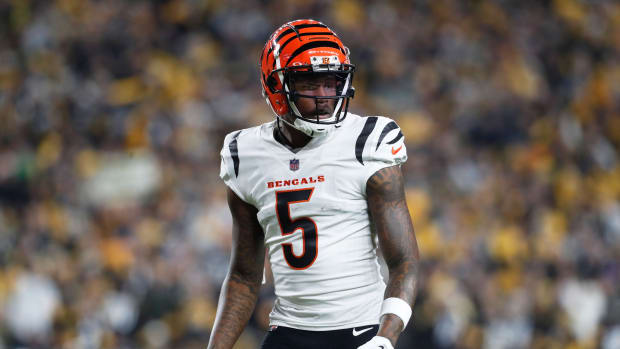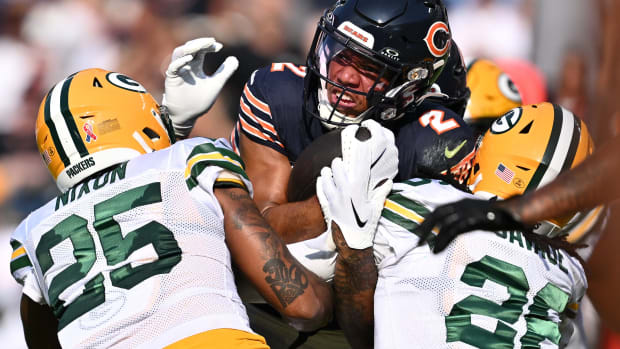America is on fire, and Colin Kaepernick tried to warn us. He saw what many white people did not want to see four years ago, and he said what many prominent white coaches and athletes are saying today. Some truths make people uncomfortable until we hear them enough, and that is really all Kaepernick did: He told the truth and made people uncomfortable. He didn’t even really raise his voice. Contrast our current national civil unrest with Kaepernick in his last NFL season: a man, before a football game, kneeling during the national anthem. It seems so quaint.
Mainstream white America is going to reconsider Kaepernick at some point—the way it reconsidered Muhammad Ali years after he refused to go to Vietnam, the way it reconsidered Jackie Robinson and Jack Johnson. Progress comes in fits and starts, and this country tends to punish those who urge it to move faster. The reconsideration of Kaepernick has begun. Today, surely, there are still millions of Americans who don’t like Kaepernick, what he said, what he did, or how he looks. But there are also surely millions who didn’t like him four years ago and who see his point now—or, at least, who understand now that Kaepernick and the athletes who kneeled with him are not on an island. Many other prominent sports figures shared his views in the past week.
Before the George Floyd video elicited such outrage, Kaepernick spoke up against police brutality and systemic racism. He was told he hated America because of how he chose to do it. He lost his career over it. And this brings up the question: What would America make of Colin Kaepernick now?
The question can be asked in two ways. One: Imagine if Kaepernick had kept playing football and kept standing for the anthem for the 2016, ’17, ’18 and ’19 seasons, and then, after seeing the brutal killing of Floyd, decided to take a knee?
Would he still lose his career over that? Doubtful. Kaepernick would have a much larger and more visible group of supporters, even in football. Think of how many white coaches (even if, largely, they are not the ultimate decision makers) spoke up in the last week, including college coaches, most of whom don’t pick a toothpaste without considering how it will affect recruiting. Think of how few of those coaches voiced support for Kaepernick in ’16 and ’17. If Kaepernick were still an NFL quarterback and started his protests today, he would probably have a lot more company, and many of those who didn’t join him would be more vocal in supporting him.
The second way to ask the question: What would happen if an NFL team signed Kaepernick now?
As a football decision, signing Kaepernick today is a tougher call for teams than it should have been back in 2017. Back then, he was 29 years old. He was coming off a season in which he threw 16 touchdown passes and four interceptions in 12 games for an awful 49ers team. He was clearly one of the best 64 quarterbacks in the world; his last coach, Chip Kelly, was adamant about it. He should have been signed. Now he is 32 and hasn’t played in three years, and while his hiatus is not his fault, it’s still a hiatus. His chances of being a viable NFL starter are lower now.
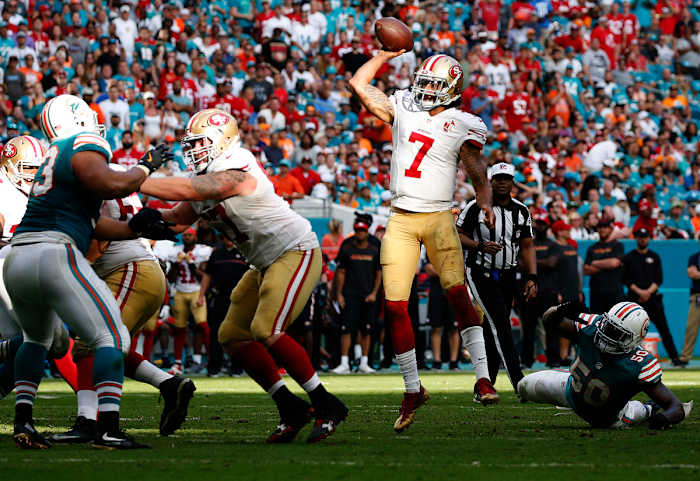
The football case for Kaepernick includes a 2016 season in which he threw 16 TDs (against four INTs), including three scores against the Dolphins.
Joel Auerbach/Getty Images
There is also the question of whether Kaepernick would accept an offer today, of whether he would view it as a public relations stunt. He wants to play football and has never wavered on that, publicly or privately. But he is a prideful, deeply principled person who puts faith in a few confidantes, is wary of others, and reacts strongly when he feels misled. If Kaepernick thought he was being used, he could say no. Any offer would have to be made in a way that he found sincere, from a source he found trustworthy, and there is no guarantee of that. (He did not believe the NFL's tryout offer last fall—on short notice and with no input from Kaepernick—was sincere, and this is why it blew up.)
But keeping Kaepernick out of the league was never about football. It was, as former league official Joe Lockhart wrote for CNN this weekend, a business decision. Owners decided, with minimal evidence, that the potential backlash was not worth it for their franchises.
And so: What if somebody does sign Kaepernick today? Does enough of America view him in a different light now—after George Floyd’s killing opened so many eyes—to change the calculus behind signing him?
The argument that Colin Kaepernick would hurt the NFL’s bottom line was always a murky one. NFL teams, by nature, are risk-averse, and they seemed to assume the worst-case scenario (a massive fan revolt) instead of the more likely one: brief outrage from a small percentage of fans who would then mostly move on. They also discounted the boon to business from his supporters. Shortly after Kaepernick began to kneel, his jersey was the league’s best seller.
Now? Well, some things have changed. America has changed. It has not changed in the ways Kaepernick wants it to change, and I am not arguing it has changed for the better. But the climate in 2020 is different than it was in ’16 in ways that would significantly change the dynamics around signing Kaepernick.
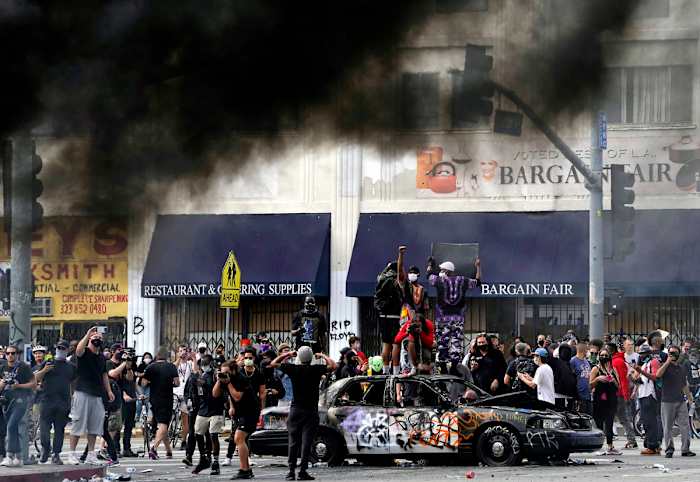
Kaepernick hasn't changed. What has? Start with a weekend of awareness-raising protests, including in L.A.
Warrick Page/Getty Images
It was easy for Kaepernick’s detractors to portray him as an extremist four years ago. It’s not so easy now, with the video everywhere of police officer Derek Chauvin emotionlessly choking Floyd to death while three of his colleagues stood by, with violence erupting all over America. (Chauvin was arrested Friday, four days after Floyd’s death, and charged with third-degree murder and second-degree manslaughter. The other officers have not been arrested.) You might not like Kaepernick taking a knee during the national anthem. You have a right to not like it. But if you sincerely support the right to protest peacefully, then you should admit: That is what Kaepernick did.
Our politics have changed, too. Again, not for the better, but remember, when Kaepernick first took a knee, Donald Trump was the Republican nominee, not an elected official, and most polls and pundits had Trump losing. The reality of a Trump presidency was difficult to imagine. After Trump was elected, Kaepernick himself said that “to me, it didn’t really matter” whether Trump or Hillary Clinton won. He said he was fighting the system.
Candidate Trump tried to turn Kaepernick into a piñata at his rallies. President Trump would probably do the same if somebody signed Kaepernick, and it would get cheers at the rallies, but in a time of George Floyd’s killing and mass unemployment and COVID-19, it might not resonate beyond the rallies like it did back then, even if the anti-Trump crowd is considerably bigger and angrier now than it was in the fall of 2016.
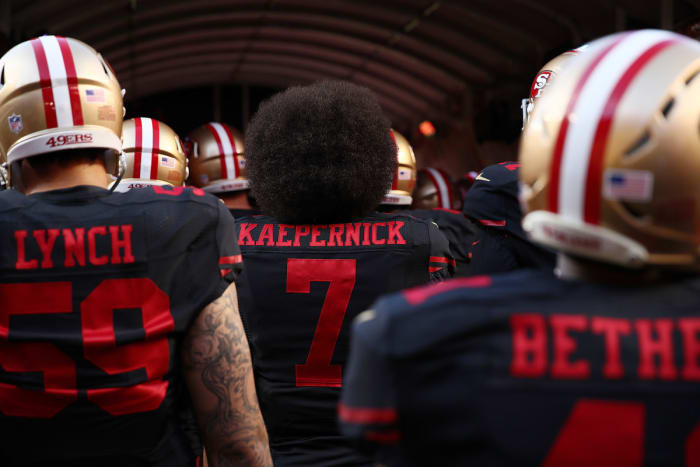
What would it mean to put Kap's nameplate on some new team's back? Would he even go for it?
Ezra Shaw/Getty Images
Even if some team did sign Kaepernick, and Trump did turn people against the NFL over it, the very business of the league is different now because of the coronavirus. The NFL’s official position is that it plans to play a full slate of games in 2020, on its normal schedule, in front of full stadiums. The reality is that this seems unlikely. COVID-19 is hard to predict, and so is society’s long-term tolerance for social distancing. But it would not be surprising at all if crowd sizes were reduced, which would mean fewer tickets, possibly at a higher cost. The reduction in supply would minimize the impact of any reduced demand tied to Kaepernick’s signing.
The potential reaction, surely, would vary by market. Some would bristle at signing Kaepernick … but in the right market, signing him would do wonders for a team’s image.
And it would do wonders for the NFL, too. People can talk about healing and inclusiveness and listening, but every statement from the NFL on this topic feels hollow and insincere, because this is still a collection of teams that blackballed Colin Kaepernick. It’s a stain on the league. All Kaepernick wanted was justice and his job. The first is hard to achieve. The second, he never should have lost.

































